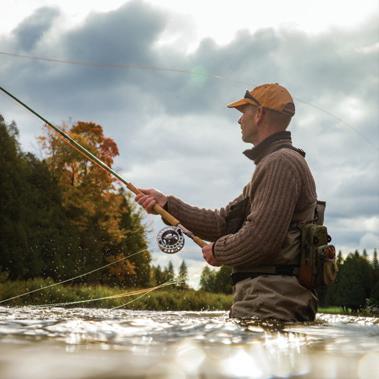
3 minute read
FIND COMMUNITY TO BUILD A HEALTHY FUTURE
Community FIND TO BUILD A
Healthy Future
By Erin S. Craw, MA (Doctoral Candidate, Chapman University), Ryan Padgett (President/Co-founder of Bold Face Fly Fishing/USAF Aircrew/LE Chaplain/1st Responder Crisis Intervention Specialist)
ONE OF THE MOST COMMON QUESTIONS PEOPLE ASK WHEN THEY FIRST MEET IS: "WHAT DO YOU DO FOR A LIVING?" AND A TYPICAL ANSWER MIGHT BE: "I WORK FOR INTEL" OR "I WORK AT A CAR DEALERSHIP." BUT IF YOU ASK A FIREFIGHTER, THE ANSWER WILL BE: "I’M A FIREFIGHTER.” OUR WORK IS WHO WE ARE.
For those who aren’t first responders, a job is one part of their lives, but many first responders see their profession as central to who they are, a source of pride, strength, and community. While that can be very positive, it can also make it extremely difficult to cope after taking off the uniform. Relying solely on the job as your identity can be a significant source of stress, isolation, and grief. It can lead to dark and dangerous places if we can't find a way to fill the hole in our lives left by the loss of our identity as a first responder.
But what about the first responders who don’t suffer that loss of identity when they leave the profession – what’s their secret? What steps can you take now to prepare for the day when you make your last 10-10 call, walk away from your career and begin the rest of your life?
Generally, an individual's sense of who they are should be based on a sense of belonging to various social groups. The demanding nature of first responder professions, however, makes it difficult to maintain roles in other groups. When firefighters retire or go out on leave, their primary – or sometimes their only – sense of identity is gone and as a result, they may be at a higher risk for emotional distress.
"What do I do now? Who am I, if not a firefighter?”
IT’S ALL ABOUT COMMUNITY
For many first responders, other roles (parent, sports enthusiast, volunteer) help them cope with stress. Fostering the different roles you have or could develop can be a huge help in safeguarding your mental health. Being
part of groups outside of work builds a sense of belonging and can help mitigate some of the stress of retiring.
First responders are highly skilled problem-solvers, focused on performance and they are often best able to relax if they can find something that engages and challenges them. The goal is to find activities that require focus, practice, and specialized knowledge and the communities of people involved in them. The benefit of specialized hobbies is that they often involve sub-tasks that will keep and hold first responders' attention but not necessarily engage their fight-or-flight responses. Activities that encourage getting out of your typical environment and creating a space where you can focus on that source of relaxation are particularly good.
Firefighters who lack that sense of belonging are tragically at a higher risk of suicide and suicidal ideation. By contrast, when we feel connected to a social group, we build resilience and have a higher likelihood of recognizing that support is available for us. These activities enable first responders
to feel needed, valued, and respected – beyond their first responder role




DEVELOP YOUR OTHER ROLES
Identifying with multiple roles and being part of other communities can help you transition out of a job and foster good mental health. The significance of other aspects of your identity is not often a focus in your first responder profession but it’s important. Fostering different roles can help you stay mentally healthy on and well beyond the job.










